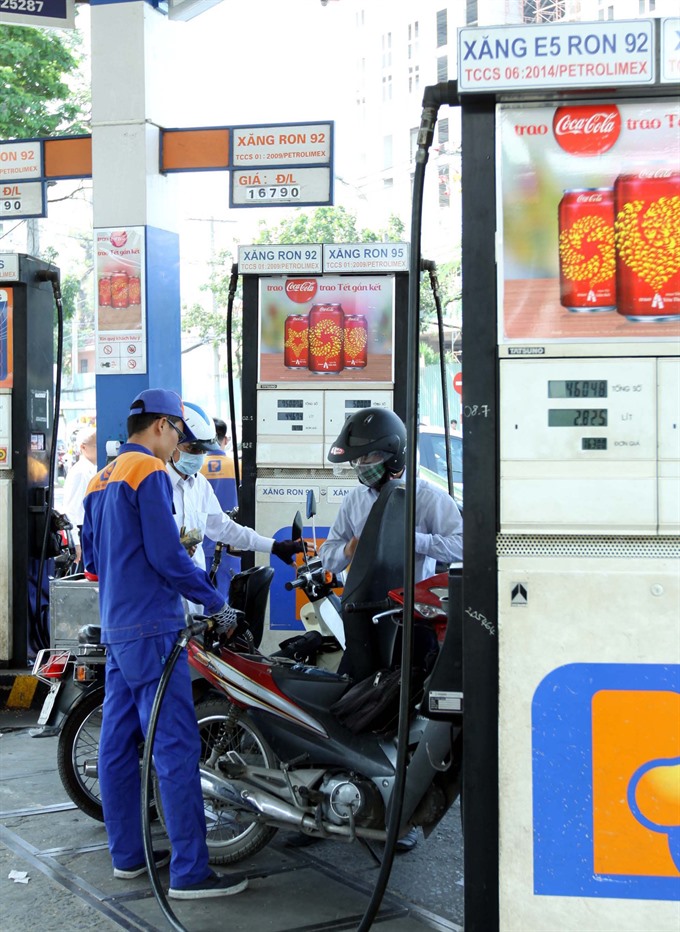 Economy
Economy

The finance ministry wants to increase environmental protection tax on petrol and oil to ensure sufficient budget collection, as the country has to cut import taxes to fulfil international commitments.
 |
| Customers fuel their motorbikes at a petrol station in HCM City. The Ministry of Finance has proposed raising environmental protection taxes on several products, including fuel. — VNA/VNS Photo Thanh Vũ |
HÀ NỘI — The Ministry of Finance wants to increase environmental protection tax on petrol and oil to ensure sufficient budget collection, as the country has to cut import taxes to fulfil international commitments.
The proposal is part of the draft Law on Environmental Protection Tax, which is scheduled to be submitted to the National Assembly for revision in October.
At a conference held late last week, Nguyễn Đình Thi, director of the ministry’s Tax Policies Department, said that as per the draft law, the environmental protection tax on petrol would be raised from the current VNĐ1,000-4,000 (US$0.04-0.18) to VNĐ3,000-8,000 per litre.
For kerosene, the proposed tax is VNĐ2,000 from VNĐ300.
Tax hikes are necessary amid Việt Nam’s rapid international integration, for which it has to fulfil international commitments, and that include cutting import taxes, Thi said, adding that the move is aimed at protecting national interests.
Petrol and oil prices in Việt Nam are lower than in 136 countries, including many ASEAN countries such as Laos, the Philippines and Singapore.
In Việt Nam, taxes (including special consumption, environmental protection and added value taxes) on petrol make up 37.5 per cent of the price, much lower than in countries such as Korea (70 per cent), Thailand (67 per cent), Laos (56 per cent) and Cambodia (40 per cent).
“The hikes will help us cope with the significant oil price fluctuations in the global market,” Thi said.
The tax is also aimed at increasing awareness on the need to protect the environment and encouraging the use of eco-friendly products.
The ministry said the tax hike would be based on a roadmap on the country’s socio-economic development and evaluation of the impact on businesses and living so as to prevent a shock for the economy.
If passed by the National Assembly, the law will take effect in 2018 at the earliest, so it will not affect petrol and oil prices this year, the ministry said.
As per ministry’s statistics, environmental tax collection totalled VNĐ106 trillion ($4.7 billion) in the 2012-16 period, accounting for 1.36 per cent to 4.27 per cent of the total collection budget each year. Money spent for environmental protection was around 2 per cent of the State budget.
The Việt Nam Petrol and Oil Association supported the environmental protection tax increases at a recent conference, stating that domestic taxes on petrol and oil should be raised to ensure budget collection. Retail prices will hardly see any changes as the decrease in import tax will make up for the rise in environmental protection tax, the association said.
However, domestic businesses are concerned that the hike will translate in a rise in the retail price of petrol, which will affect prices of other products and burden the economy, especially local enterprises.
Nguyễn Đức Hùng Linh from Saigon Securities Inc argued that the environmental protection tax should not be raised, given the current economic situation. The budget has run a surplus in the first four months of this year, driven by improved collection of personal income tax, import-export taxes, VAT and corporate income tax, Linh pointed out.
Environmental protection tax should not be raised as long as the purchasing power remains low, he added. If it is not raised, consumers will likely spend more on necessary products such as food and food stuff.
“This will ensure a better living standard, while promoting consumption,” Linh said, adding that the hike would impact the low-income group.
Nguyễn Tiến Thỏa, former director of the finance ministry’s Prime Management Department, said it was important to do a comprehensive, careful evaluation on the impact of a hike in environmental protection tax as it will have an effect on many economic sectors.
“The tax must be at a reasonable level to nurture budget collection,” Thỏa said, adding that a reasonable tax level would stimulate production, business and consumption, and collection of other taxes would rise while jobs are created.
In the draft law, the ministry has also proposed to raise tax on hydrochlorofluorocarbon liquids and plastic bags, in an effort to limit the use of these environmentally harmful products. — VNS




